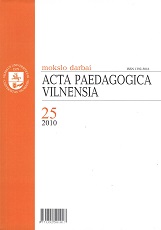LEONO JOVAIŠOS ASMENYBĖS KONCEPCIJA: LYGINAMOJI ANALIZĖ
LEONAS JOVAIŠA’S THEORY OF PERSONALITY: COMPARATIVE ANALYSIS
Author(s): Rolandas PaulauskasSubject(s): Education
Published by: Vilniaus Universiteto Leidykla
Keywords: asmenybė1; asmenybės struktūra2; aktyvumas3; motyvacija4; bruožai5;
Summary/Abstract: The article is dedicated to L. Jovaiša’s significant contributions to the development and enhancement of psychological and educational sciences in Lithua¬nia. In spite of the lengthy and ongoing debate about the teleology of human behavior, L. Jovaiša suggests that our activity motives are mostly determined by personal purposes and goals rather than external fac¬tors. Professor L. Jovaiša does not agree with the psychoanalytic opinion that unconscious drives such as libido and aggression serve as underlying forces of our conduct. He also debates the behavioristic approach regarding the influence of prior stimuli and operant conditioning that may determine hu¬man behavior. Although his optimistic approach to the quality of human nature, the dynamics of human needs and development of personality is somewhat similar to those of Gordon Allport and humanistic psychologists, L. Jovaiša argues that none of the cur¬rent theories include temperamental, charactero logi¬cal, motivational, cognitive and other components of a live person. Personality structure is very complex and indivisible. Cognition cannot be separated from motivation, temperament, emotions, character, etc. L. Jovaiša’s personality theory is also educationally oriented as compared to other personality concepts. It has been empirically tested by his graduate stu¬dents and other researchers and deserves a wider ac¬knowledgement by European scholars. To this day the theory remains very unique and will continue to serve as the background for further research and edu¬cational purposes. Key words: Personality, personality structure, activity, motivation, traits.
Journal: Acta Paedagogica Vilnensia
- Issue Year: 2010
- Issue No: 25
- Page Range: 57-68
- Page Count: 12
- Language: Lithuanian

